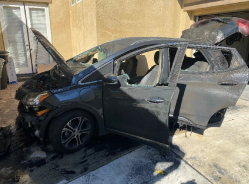
— A Chevy Bolt battery recall was allegedly announced too late to help owners who have watched their cars burn. According to a class action lawsuit, a Bolt battery recall offers only an interim repair that will cause the cars to lose 10% of their mileage range.
The lawsuit also claims General Motors held off on a formal recall even though the batteries are allegedly unsafe and unable to be fully charged without catching fire.
The 2017-2019 Chevrolet Bolt electric vehicles were allegedly sold with specific mileage claims that don't match real-world driving.
Customers will receive decreased travel range while driving because the Chevy Bolt battery recall will limit the battery’s range to approximately 214 miles on a single battery charge, at least 10% less than advertised.
California plaintiff Michelle Pankow purchased a new 2017 Chevrolet Bolt with a window sticker that said the car could travel 238 miles on a single battery charge. However, the Bolt lawsuit alleges the car would only show a projected range of 170 miles when the battery was fully charged.
The plaintiff took the Bolt to a dealership where technicians said there was nothing wrong with the battery but the computer system had been updated.
The plaintiff says the Bolt continued to show a range of 170 miles fully charged, so the car was again brought to the dealership where technicians said nothing could be done. The class action lawsuit alleges the plaintiff was told diagnostics had already been performed without any errors and nothing could be done about the battery.
The plaintiff says she was told the decrease in range was likely caused by degradation of the battery’s ability to "hold a charge combined with then-prevailing weather conditions."
Upset, the plaintiff says she contacted GM customer service and was allegedly told "the battery’s depreciation was supposedly 'normal,' and that it could lose 40% of its range over time and GM would consider it to be operating normally."
According to the Bolt lawsuit, the plaintiff was in bed directly above the garage where the Bolt was parked and being charged. She says she heard a "whoosh" sound coming from the garage and got up to check things out. She opened the door and smoke entered into the house from the garage.
The plaintiff says she opened the garage door to vent the smoke and then unplugged the Bolt battery charger. She ran upstairs to get her daughter and the family dog and finally exited the house where she watched the fire from the street.
The plaintiff also alleges she heard an explosion coming from the garage which caused the garage door to close.
The lawsuit says everything in the garage was destroyed, including the car. The house is almost a total loss because of the smoke, fire and water damage, and fire officials allegedly traced the fire to the floorboard of the Bolt. The location is under the rear seats and in the same location as the battery pack.
"Michelle suffered smoke inhalation and both her and her daughter have severe post-traumatic stress disorder resulting from the incident. E.G.P. [her daughter] continues to express fear and is afraid to return to the home. As a result of the fire, the Pankows filed a report with NHTSA and a formal complaint with Defendant. GM has not responded to her complaint." - Chevy Bolt battery fire lawsuit
The Chevrolet Bolt lawsuit alleges the lithium-ion batteries and the management systems are defective and inadequate to prevent battery fires that consume the cars and surrounding structures.
In November, General Motors recalled about 50,000 model year 2017-2019 Bolt EV cars after reports of battery fires in cars that were parked and unattended. The National Highway Traffic Safety Administration says it seems the fires occurred when the batteries were nearly or fully charged.
General Motors says the recall repairs include an interim software update to limit the battery charge. However, that move also decreases the range of the car by about 10%.
The Chevy Bolt battery fire lawsuit was filed in the U.S. District Court for the Central District of California: Pankow, et al., v. General Motors, LLC, et al.
The plaintiffs are represented by McCune Wright Arevalo, LLP.




